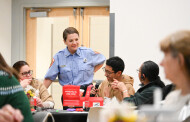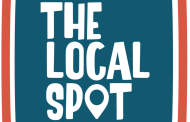The teenage years are often some of the best of one’s life – brimming with exploration, self-discovery and newfound independence. But the road to adulthood can be a bumpy one, paved with significant physical and emotional changes. Navigating it can sometimes lead adolescents to alcohol and drug experimentation, with many becoming addicted.
High school students battling substance use disorders often have no choice but to return to the same environment where they likely began their addiction, but a new school in Raleigh is determined to change that. Wake Monarch Academy will open its doors by fall 2021 at Open Table United Methodist Church, located at 824 N. Bloodworth Street in downtown Raleigh, for adolescents who have completed treatment for substance addiction and are in active recovery.
Wake Monarch Academy was founded by Leah Wright, a retired Wake County educator whose son struggled with substance use in high school. During a family support group session, she learned about the Emerald School of Excellence, a secondary school in Charlotte for students with substance use disorders. Recalling the lack of teen addiction services in North Carolina and a supportive educational environment for her son, Wright felt a calling to help other families experiencing similar challenges.
Together with her husband, Wright watched the documentary “Generation Found,” which explores how the city of Houston ignited a youth recovery revolution through its system of treatment centers, sober high schools, alternative peer groups and collegiate recovery programs. The inspirational documentary fueled the Wrights’ desire to start a local, drug-free high school where students can build the confidence to pursue their academic, personal and professional goals.
“I feel that if our son had this opportunity, then his addiction would not have developed as it did,” Wright says. “Drug addiction can happen to any child.”
The National Institute on Drug Abuse states that people are most likely to begin abusing drugs –including tobacco, alcohol, and illegal and prescription drugs – during adolescence and young adulthood. By the time they are seniors, almost 70% of high school students will have tried alcohol, half will have taken an illegal drug, nearly 40% will have smoked a cigarette, and more than 20% will have used a prescription drug for a nonmedical purpose. The majority of those who have a substance use disorder started using before age 18 and developed their disorder by age 21. Peer pressure, rebellion, wanting to experience feelings of pleasure, and wanting to escape or self-medicate are just some of the reasons why teenagers turn to these substances. Genetics and the influences of popular media are also to blame.
Wright offers a sobering thought on teenage substance use: “When an adolescent starts to use drugs, their brain stops developing.” The brain’s prefrontal cortex, which plays an important role in decision making, isn’t fully matured until around the age of 25. Prior to that, a young person is more prone to making impulsive decisions and taking risks, including those involving drugs and alcohol. But detrimental brain changes can be reversed once addiction treatment begins.
Wright says that while Wake Monarch Academy will not function as a treatment center, it will offer a strong educational program and counseling, which are crucial in a recovery high school. “Otherwise, you’re setting them up for failure,” she says. Wright explains that for adolescents who return to the same environment that led to their addiction, “There’s a 70% chance of return to drug use within six months, but there’s only a 30% chance at a recovery high school.”
A private and accredited institution, Wake Monarch Academy will serve adolescents ages 13-21 who have completed at least a 30-day drug rehab program and will admit them on a rolling basis due to the nature of addiction and recovery. It hopes to model itself after Houston’s Archway Academy, which is featured in “Generation Found” and is the largest drug-free high school in the U.S. Members of the Wake Monarch board trained with leaders at Archway to learn the best methods for operating the school.
Admission to Wake Monarch Academy may be based on in-person interviews; a compelling essay; reference letters from a primary treatment provider, counselor, and parent; and other criteria. As part of their rehabilitation process, students will establish their motivation to maintain their sobriety, and be required to undergo frequent and random drug testing. Anyone who can commute to the school is welcome to apply. Wright expects first-year enrollment to be capped at 10 students, with enrollment increasing by three to five students each consecutive year. Administrators are intent on making the tuition affordable for families and offer sliding scale pricing for those in need.
Wake Monarch Academy plans to offer a combination of direct and online instruction, as well as music therapy, art therapy, life skills and more. The school is ideally located near a public transit system, eating venues, and community partners that will also assist students in their learning and recovery. Students who complete their education will earn a high school diploma and be academically prepared to enroll in college.
“We want to make sure that they’re a good fit for us, and they want recovery for themselves and want to be here,” Wright says. “Our environment will be an additional way for them to be able to continue their recovery. The difference is that they will have that support with other students going through the same thing.”
Alternative peer groups, known as APGs, play an important role in that healing. Similar to an after-school program, APGs give teens the opportunity to have sober fun together. Wright hopes to establish these as they provide support not only for the adolescents, but for their families as well.
“What we have found successful in other recovery high schools is when kids go to school during the day and go to their APG in the afternoon and on the weekend…they are constantly around their peers who are also in recovery,” Wright explains. Students will enjoy a free lunch together every day at A Place at the Table on W. Hargett Street. During Friday Fillups, they will attend school in the morning and engage in community service projects in the afternoon.
As a nonprofit, Wake Monarch Academy depends on funding. Donations will cover start-up and operational costs, teacher salaries, counseling services, collaboration with outside agencies, drug testing, toxicology screening, family education and counseling, APGs, accreditation processing, utilities and more. The school held its first official fundraiser, Be The Light Virtual 5K, on September 12 in memory of Matthew Umstead, who lost his battle with drug addiction in 2018. His mother, Michelle Umstead, is open about her son’s struggles and offers valuable support to other families in crisis.
“Drug addiction doesn’t discriminate. It’s truly a disease, not a choice, and kids don’t know they’re playing roulette the first time they take the substance,” Umstead says. She points out that because of the stigma surrounding drug addiction, many families don’t talk about it. For adolescents who aren’t aware that addiction may run in their family, their risk is heightened.
Wright and Umstead believe wholeheartedly in the teens who choose to overcome their substance use disorder and become productive members of society. “I want these kids to realize the world is their oyster,” Umstead says. “Whatever their dream is, they can achieve it, whether it be a four-year college or studying a trade. They can realize their dream is still very much alive.”
Wright, who will soon see her own dream realized, adds, “These are good kids who made some wrong choices, but we love them for who they are.”
To learn more about Wake Monarch Academy, visit WakeMonarchAcademy.org and Facebook.com/WakeMonarch. For more information about Be the Light 5K, visit Facebook.com/BeTheLight5kforMatthew.







